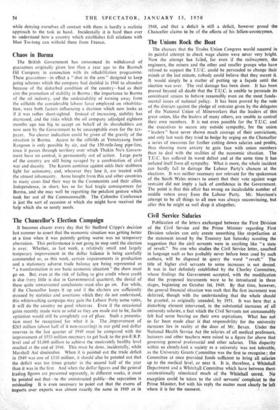The Chancellor's Election Campaign
It becomes clearer every day that Sir Stafford Cripps's decision last summer to assert that the economic situation was getting better at a time when it was patently getting worse was no temporary aberration. This performance is not going to stop until the election is over. Whether, as last week, a relatively small and largely temporary improvement in the dollar balance is being carefully commended or, as this week, certain improvements in production and a stationary adverse trade balance are being represented as "a transformation in our basic economic situation" the show must go on. But, even at the risk of failing to give credit where credit Is due (very little is due in Governmental quarters), the denial of these quite unwarranted conclusions must also go on. For while, If the Chancellor keeps it up and if the electors are sufficiently stunned by statistics and assertions which they do not understand, this whitewashing campaign may gain the Labour Party some votes, it will do the country no good whatever. Even if the occasional gains recently made were as solid as they are made out to be, facile optimism would still be completely out of place. Such a presenta- tion must be recognised for what it is. The _improvement of $263 million (about half of it non-recurring) in our gold and dollar reserves in the last quarter of 1949 must be compared with the improvement of $553 million necessary to get back to the pre-E.R.P. level and of $1,008 million to achieve the moderately healthy level reached at the end of 1946. This must be done, incidentally, while Marshall Aid diminishes. When it is pointed out the trade deficit in 1949 was one of £110 million, it should also be pointed out that the deficit was ten times greater in the second half of the year than it was in the first. And when the dollar figures and the general trading figures are presented separately, in different weeks, it must be pointed out that—to the uninstructed public—the separation is misleading It is even necessary to point out that the excess of imports over exports was almost exactly the same in 1949 as in
1948, and that a deficit is still a deficit, however proud the Chancellor claims to be of the efforts of his fellow-countrymen.






























 Previous page
Previous page